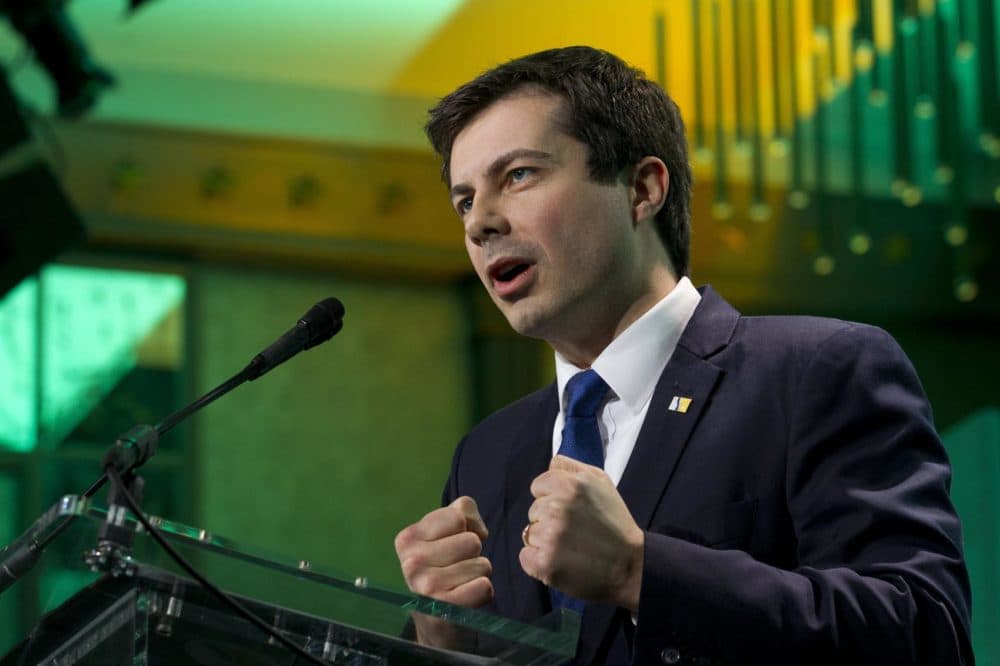Advertisement
More Than 1,000 Show Up To See 'Mayor Pete' At Northeastern University

It was a younger crowd at Northeastern University Wednesday night, as students and millennials packed an auditorium and overflow room to see Pete Buttigieg, the Democratic mayor of South Bend, Indiana, speak about his likely presidential run.
More than 1,000 people showed up for the talk by "Mayor Pete," according to a WBUR tally, blasting the university's expectation that about 150 people would show up.
School officials first invited Buttigieg nine weeks ago, but since then, interest in his campaign has exploded.
Some attendees were workers in their 20s and 30s, but most were Northeastern students interested in a candidate not too much older than they.
"He's a millennial" said Kyle Ozeuna. "He's 37, kind of in touch with what people in this room might be more interested in than other candidates."
Four years ago, Ozeuna went door to door for Bernie Sanders. A Northeastern senior now, he says won't be campaigning for Sanders again.
"No," Ozeuna says. "I think he's too divisive in the Democratic Party right now. He did a good job of turning it left, but I don't think he's the one who can win against [President] Trump in 2020."
Ozeuna says he wants a younger candidate.
"Honestly, someone in my generation who is aware of problems that millennials will be facing in 20 or 30 years instead of just the same old 70-plus-year-olds disconnected from an increasingly larger portion of American society," Ozeuna said.
That generational shift in power is something 34-year-old Bobby Ortega, a financial analyst, and 29-year-old Tim Smith, a Chelsea schoolteacher, are looking for as well. Smith voted for Sanders in the 2016 primary. But this time Ortega and Smith find it appealing that Buttigieg is a veteran.
Advertisement
"I think that in order to make a well-informed decision on sending people over there and knowing what it's like, you might want to have served in a war yourself," Smith says.
"Yeah, I agree with that," Ortega said. "We have the president now who dodged going to war a couple of times. It's good to have someone who has experience making decisions. I think he told an anecdote about how when he went off to get deployed, he had to write a letter to his parents in case he didn't come back. He said that being in that kind of head space gives you a different perspective on how it affects everything."
Another former Sanders supporter, Christina Nguyen, in her fifth year at Northeastern, says someone else has assumed the mantle of the left.
"Right now, Elizabeth Warren is running, and she's my senator, so the local preference takes precedent," Nguyen says.
The primaries are not until next year, and Josue Espinoza is still looking for a candidate. He works at Massachusetts General Hospital, managing a transgender health program and some endocrinology clinics.
Ezpinoza asked Buttigieg a question about the Affordable Care Act.
"Something that works in California will not work in North Dakota, maybe, right?" Espinoza asked, standing at the head of one of several lines at microphones. "How do we address the diversity of our nation in every aspect, geographically, regionally, whatever it is, and not a one-size-fits-all approach?"
"I think what we have to do is we have to be smart in mapping the things that aren't the same and the things that are," Buttigieg replied. "So the things that aren't the same, for example, is the availability of certain specialty care which may be very dense in a place like Boston, and the opposite in a place like North Dakota, but we can't let that overtake what really is universal, which is the extent to which everybody needs health care and everybody needs a way to pay for it."
Buttigieg said he wants Medicare for all who want it.
Espinoza said afterwards Buttigieg avoided answering his question.
"Our country is very different," Espinoza said. "It's diverse economically, geographically, and I don't think that a Medicare for all who want it is something that will work."
A Northeastern freshman asked Buttigieg whether he supports free public college.
Buttigieg said he opposes it.
"Americans who have a college degree earn more on average than Americans who don't, and as a progressive, I have a hard time getting my head around the idea that a majority who earn less because they didn't go to college would subsidize a minority who earn more because they did all the way to 100%," Buttigieg said.
Buttigieg said that might not be the best political answer given the crowd, but he received a warm applause anyway.
The young audience responded enthusiastically to much that Buttigieg said: about the urgency of responding to climate change, about his husband, about the importance of millennials and the generation after them participating in politics.
This segment aired on April 4, 2019.
